Submitted:
13 April 2024
Posted:
15 April 2024
You are already at the latest version
Abstract
Keywords:
1. Introduction: Unused Places and the Issue of Sustainability
1.1. Background
1.2. Structure, Methods, and Research Issues
2. Unusable Urban Places, Creative Cities, and Sustainability
3. The Case of the Vilnius Sport Palace (VSP)
| Interested part | Interest | Hero |
|---|---|---|
| The government | Making the place work by reconciling different interests | Prime Minister |
| Municipality | Reconstruct the VSP by establishing a conference centre | Mayor |
| Private investor | Demolish the VSP, build a new building | Investor, shareholder |
| Jewish community | Demolish the VSP, do not build anything, restore the Jewish cemetery | Chairman of the community |
| Union of Architects | To preserve the building and the memory of the architect | Chairman of the Union |
| Department of Cultural Heritage | Preserve the building and its unique roof construction, and preserve the Jewish cemetery | Head of the department |
| Tourism and hotel associations | Establish a conference centre | Heads of associations |
4. Discussions
5. Conclusions
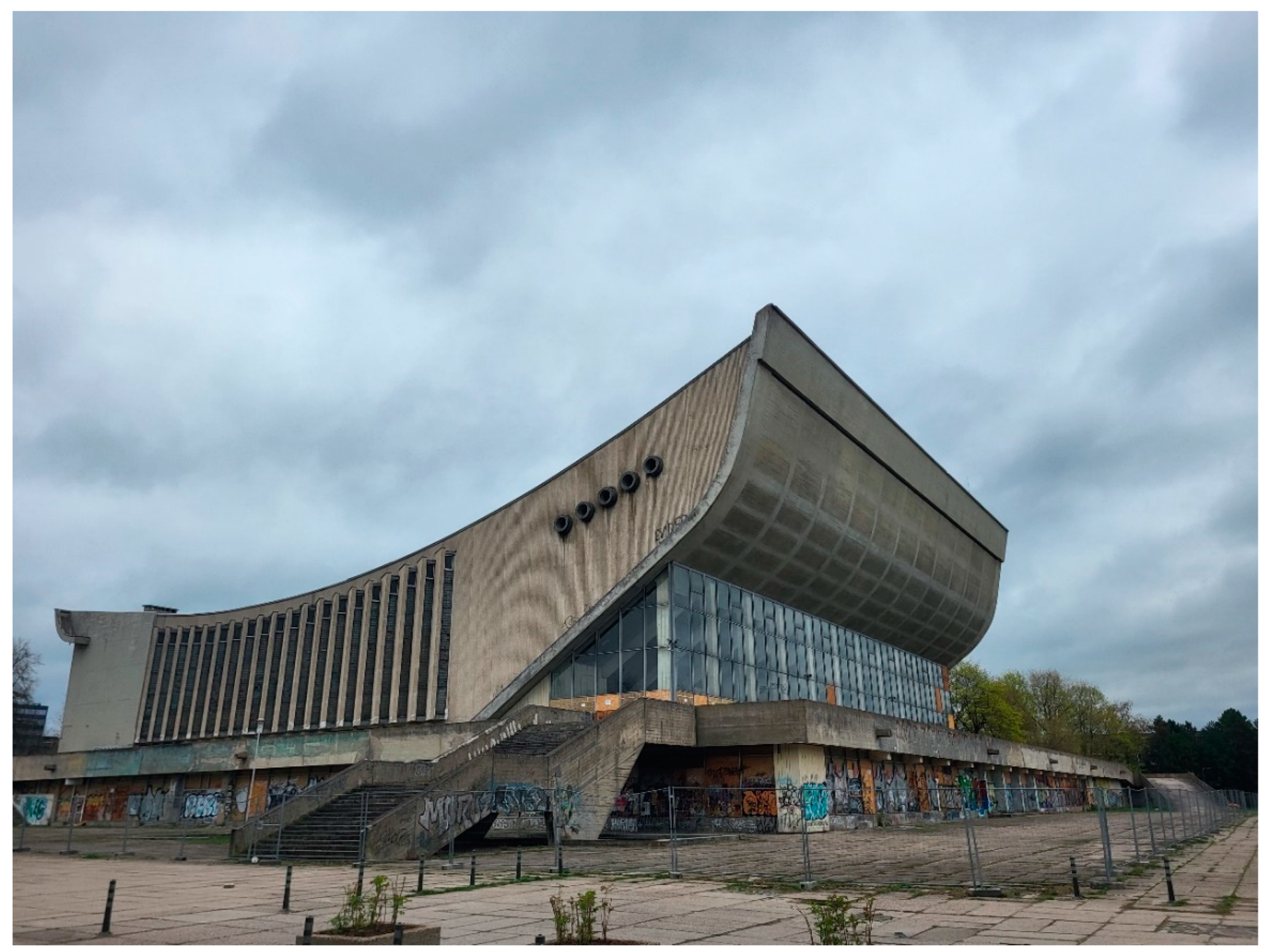
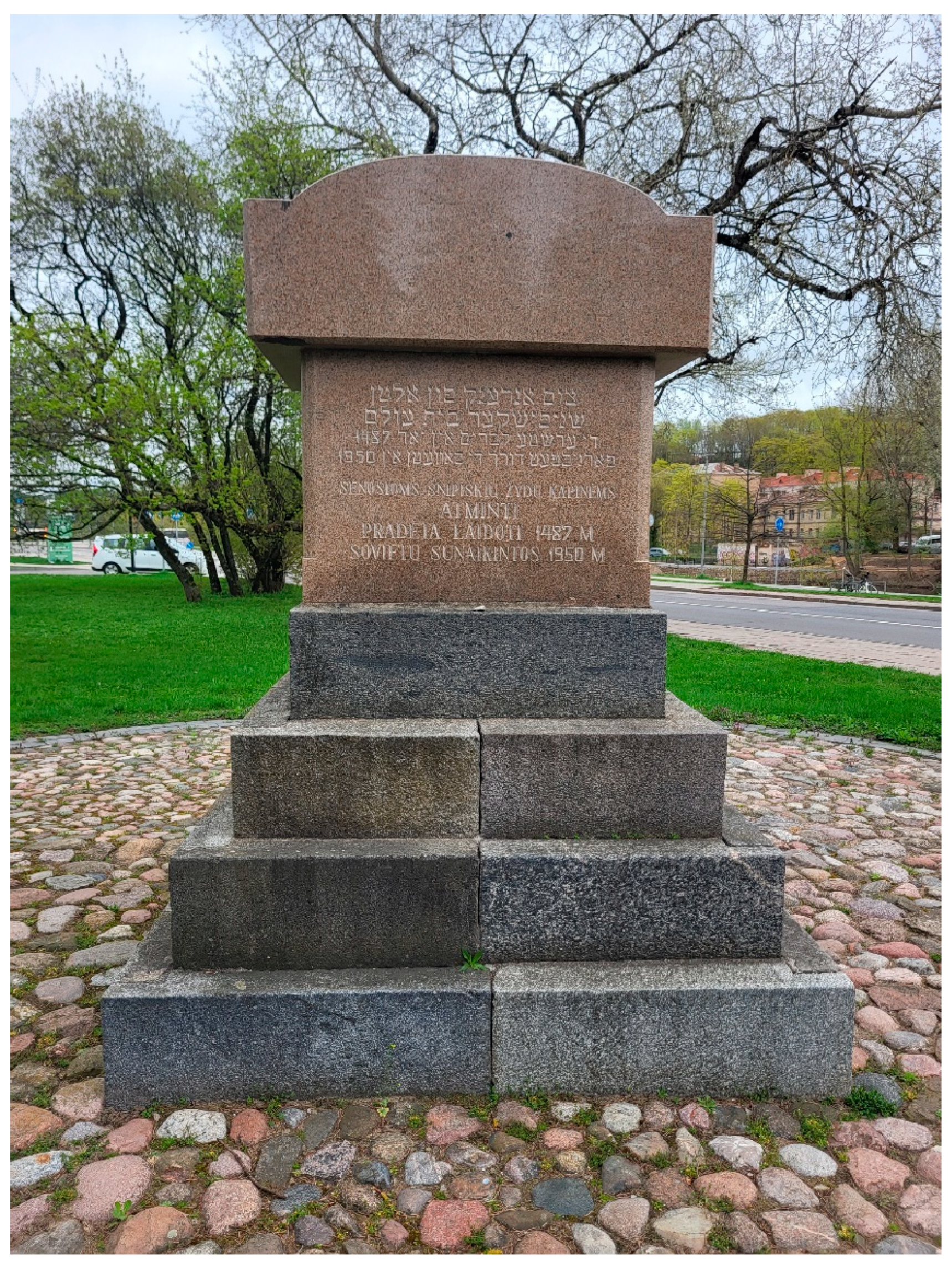
References
- Accordino, J., and G. T. Johnson. 2000. Addressing the vacant and abandoned property problem. Journal of Urban Affairs 22 (3): 301–315. [CrossRef]
- Aguilar, A. G. 2007. Peri-urbanization, illegal settlements and environmental impact in Mexico City. Cities 25 (2008) 133–145. [CrossRef]
- Aken, K. L. V. 2016. The critical role of creativity in research. MRS Bulletin 41: 934–938.
- Akkerman, A., and A. F. Cornfeld. 2010. Greening as an urban design metaphor: Looking for the city’s soul in leftover spaces. The Structurist 49 (50): 30–35.
- Andres, L., and B. Grésillon. 2013. Cultural brownfields in European cities: A new mainstream object for cultural and urban policies. International Journal of Cultural Policy 19 (1): 40–62. [CrossRef]
- Aruninta, A. 2004. Controversies in public land management decision-makings: Case study of land utilization in Bangkok. Bangkok: Chulalongkorn University.
- Barata-Salgueiro, T., and P. Guimarães, 2020. Public policy for sustainability and retail resilience in Lisbon city center. Sustainability 2020, 12, 9433; [CrossRef]
- Bertacchini, E., and W. Santagata. 2012. Atmosfera Creativa. Bologna: Il Mulino.
- Bowman, A., and M. Pagano. 2004. Terra incognita: Vacant land and urban strategies. Washington: Georgetown University Press.
- Cachinho, H., and T. B. Salgueiro. 2016. Os sistemas comerciais urbanos em tempos de turbulência: Vulnerabilidades eníveis de resiliência. Finisterra 2016, 51, 89–109.
- Casals-Alsina, È. 2023. Can the ‘creative city’ be sustainable? Lessons from the Sant Martí district (Barcelona). International Journal of Cultural Policy, 1 – 18. [CrossRef]
- Colomb, C. 2012. Pushing the urban frontier: Temporary uses of space, city marketing, and the creative city discourse in 2000s Berlin. Journal of Urban Affairs 34 (2): 131–152. [CrossRef]
- Cooke, P., and L. Lazzeretti. 2008. Creative cities, cultural clusters and local economic development. Cheltenham: Edward Elgar.
- Currid, E. 2007. The Warhol economy. Princeton, New Jersey: Princeton University Press.
- Cybriwsky, R. 1999. Changing patterns of urban public space: Observations and assessments from the Tokyo and New York metropolitan areas. Cities 16 (4): 223–231. [CrossRef]
- Della Lucia, M., and M. Trunfio. 2018. The role of the private actor in cultural regeneration: Hybridizing cultural heritage with creativity in the city. Cities 82: 35–44.
- De Solà-Morales, I. 2013. “Terrain vague”. In P. Barron, and M. Mariani (eds.). Interstices at the edge of the pale. London: Routledge, 38–44.
- Doron, G. M. 2000. The dead zone and the architecture of transgression. City 4 (2): 247–263. [CrossRef]
- D’Ovidio, M., and A. Rodríguez Morató. 2017. Against the creative city? Activism in the creative city: When cultural workers fight against creative city policy. City, Culture & Society 8: 1–4.
- Duxbury, N., J. Hosagrahar, and J. Pascual. 2016. “Why must culture be at the heart of sustainable urban development?” http://www.agenda21culture.net/sites/default/files/files/documents/en/culture_sd_cities_web.pdf Retrieved 01-04-2024.
- Florida, R. 2002. The rise of creative class. New York: Basic Books.
- Florida, R. 2005. Cities and Creative Class. New York: Routledge.
- Grodach, C. 2012. Before and after the creative city: The politics of urban cultural policy in Austin, Texas. Journal of Urban Affairs 34 (1): 81–97. [CrossRef]
- Harvey, D. 2012. Rebel cities: From the right to the city to the urban revolution. New York: Verso Books.
- Hawkes, J. 2001. The fourth pillar of sustainability: Culture’s essential role in public planning. Melbourne: Common Ground Publishing Pty Ltd. in association with the Cultural Development Network (Vic). https://www.culturaldevelopment.net.au/downloads/FourthPillarcomplete.pdf Retrieved 01-04-2024.
- Hentilä, H.-L., and T. Lindborg. 2003. “Central micro-peripheries: Temporary uses of central residual spaces as urban development catalysts.” In Paper Read at ERSA Conference Papers, Finland. https://www.econstor.eu/bitstream/10419/116068/1/ERSA2003_242.pdf Retrieved 01-04-2024.
- Hall, P. 2020. The age of the city: The challenge for creative cities. In Balzan Papers: III. Florence: Leo S. Olschki, 231–252.
- Howkins. J. 2013. The creative economy: How people make money from ideas. London: Penguin Books.
- Hwang, S. W., and S. J. Lee. 2020. Unused, underused, and misused: an examination of theories on urban void spaces. Urban Research & Practice 13 (5): 540–556.
- Jacobs, J. 2004. Dark age ahead. Toronto: Random House of Canada.
- Joteikaitė, E. 2023. Neigia gandus apie ketinimus griauti Sporto rūmus Vilniuje, tačiau jų ateitis lieka neaiški [Denies rumours about plans to demolish the VSP but its future remains unclear]. https://www.delfi.lt/kultura/naujienos/neigia-gandus-apie-ketinimus-griauti-sporto-rumus-vilniuje-taciau-ju-ateitis-lieka-neaiski-93056033 Retrieved 30-03-2024.
- Kačerauskas, T. 2023. The dissonant heritage: the case of the Soviet memorial in Antakalnis cemetery, Vilnius. International Journal of Heritage Studies 29 (7): 728–741.
- Kačerauskas, T.; Baranovskaja, I. 2021. Should we destroy our Soviet heritage? Exploring the case of Soviet-era sculptures on the Green Bridge, Vilnius, through an analysis of media debates. Journal of Baltic Studies 52(4): 613–633. [CrossRef]
- KEA European Affairs. 2009. The impact of culture on creativity. A study prepared for the European Commission (Directorate-General for Education and Culture). https://keanet.eu/wp-content/uploads/2019/09/impactculturecreativityfull.pdf Retrieved 01-04-2024.
- Kong, L. 2009. Making sustainable creative/cultural space in Shanghai and Singapore. Geographical Review 99(1), 1–22.
- Kong, L. 2012. Singapore & the making of a “creative city”. Macau: Chinese Creative Industries Forum.
- Kowarik, I. 2018. Urban wilderness: Supply, demand, and access. Urban Forestry & Urban Greening 29 (2018) 336–347 http://dx. [CrossRef]
- Krueger, R., and S. Buckingham. 2012. Towards a ‘consensual’ urban politics? Creative planning, urban sustainability and regional development. International Journal of Urban and Regional Research 36 (3): 486–503. [CrossRef]
- Landry, C. 2000. The creative city: A toolkit for urban innovators. Strout: Comedia.
- Landry, C., L. Greene, F. Matarasso, and F. Bianchini. 1996. The art of regeneration: Urban renewal through cultural activity. London: Da Costa Print.
- Lorenzen, M., & L. Frederiksen. 2008. Why do cultural industries cluster? Localization, urbanization, products and projects. In P. Cooke, and L. Lazzeretti (Eds.). Creative cities, cultural clusters and local economic development. Cheltenham: Edward Elgar, 155–179.
- Lynch, K. 1990. The Waste of Place. Places 6 (2): 9–23.
- Manovich, L. 2002. The Language of New Media. Cambridge, London: The MIT Press.
- Martí-Costa, M., and M. Pradel-Miquel. 2012. The Knowledge City Against Urban Creativity? Artists’ Workshops and Urban Regeneration in Barcelona. European Urban and Regional Studies 19 (1): 1–17. [CrossRef]
- McCann, E. J. 2007. Inequality and politics in the creative city-region: Questions of livability and state strategy. International Journal of Urban and Regional Research 31 (1): 188–196. [CrossRef]
- McGranahn, G., and D. Satterthwaithe. 2003. Urban centers: an assessment of sustainability. Annual Review of Environmental Resources 28: 243–274.
- Plokštytė, A. 2024. Vilniaus sporto rūmų likimas: rimtis ar triukšmingi susibūrimai? [The fate of the VSP: seriousness or noisy gatherings?] https://www.bernardinai.lt/vilniaus-sporto-rumu-likimas-rimtis-ar-triuksmingi-susiburimai/ Retrieved 30-03-2024.
- Pratt, A. 2011. The cultural contradictions of the creative city. City, Culture & Society 2: 123–130.
- Ratiu, D. E. 2013. Creative cities and/or sustainable cities: Discourses and practices. City, Culture & Society 4 (3): 125–135. [CrossRef]
- Ricoeur, P. 2007. The conflict of interpretations: Essays in hermeneutics. Evanston: Northwestern University.
- Sasaki, M. 2010. Urban regeneration through cultural creativity and social inclusion: Rethinking creative city theory through a Japanese case study. Cities 27: 3–9.
- Scott, A. J. 2006. Creative cities: Conceptual issues and policy questions. Journal of Urban Affairs 28 (1): 1–17. https://. [CrossRef]
- Smidt-Jensen, S. 2007. “The roles of culture and creativity within urban development.
- strategies: Outlining a theoretical framework for analysing Scandinavian cities.” https://byforskning.ku.dk/filer/wp_8.pdf Retrieved 01-04-2024.
- Steward, W. C., and S. S. B. Kruska. 2010. Developing and sustaining creative cities: A sustainability tool for designers, planners, and public administrators. International Journal of Sustainable Development 13 (1): 6–16. [CrossRef]
- Tavano Blessi, G., D. G. Tremblay, M. Sandri, and T. Pilati. 2012. New trajectories in urban regeneration processes: Cultural capital as source of human and social capital accumulation – evidence from the case of Tohu in Montreal. Cities 29(6), 397–407.
- Trancik, R. 1986. Finding Lost Space: Theories of Urban Design. New York, NY: John Wiley & Sons.
- UCLG (United Cities and Local Governments). 2010. “Culture: Fourth Pillar of Sustainable Development.” http://www. agenda21culture.net/sites/default/files/files/documents/en/zz_culture4pillarsd_eng.pdf.
- UNESCO. 2004. Creative cities network. https://en.unesco.org/creative-cities/home Retrieved 01-04-2024.
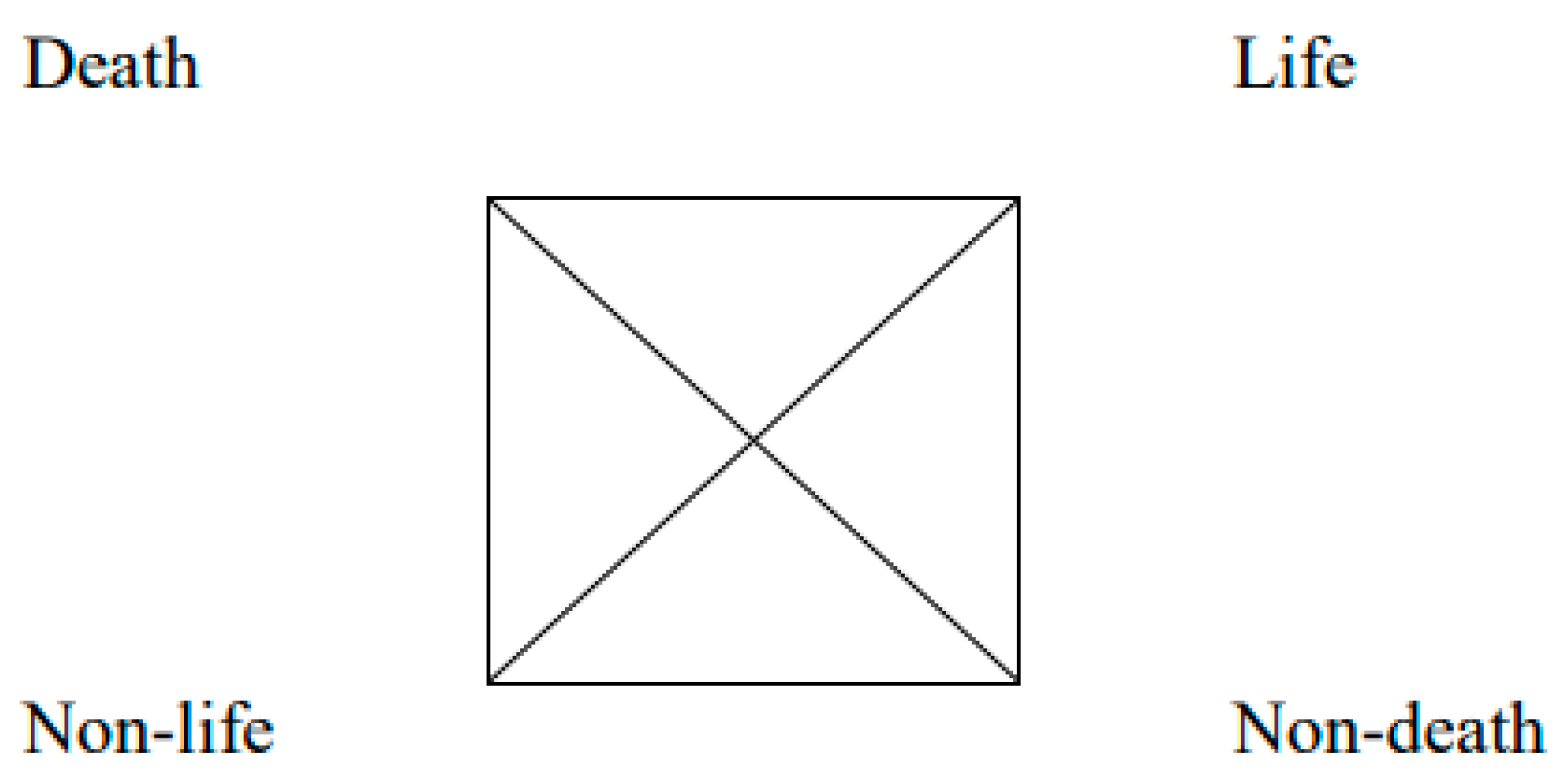
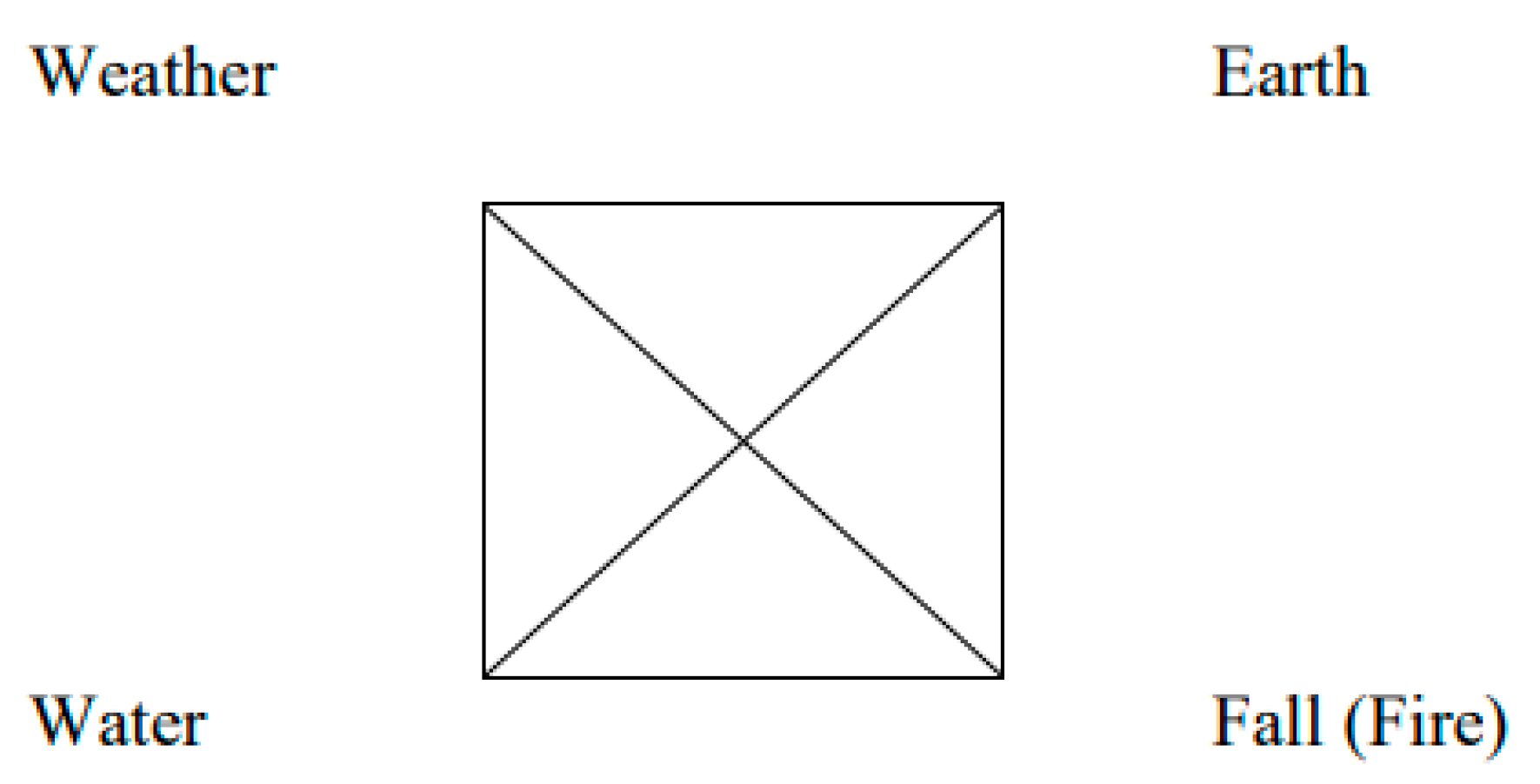
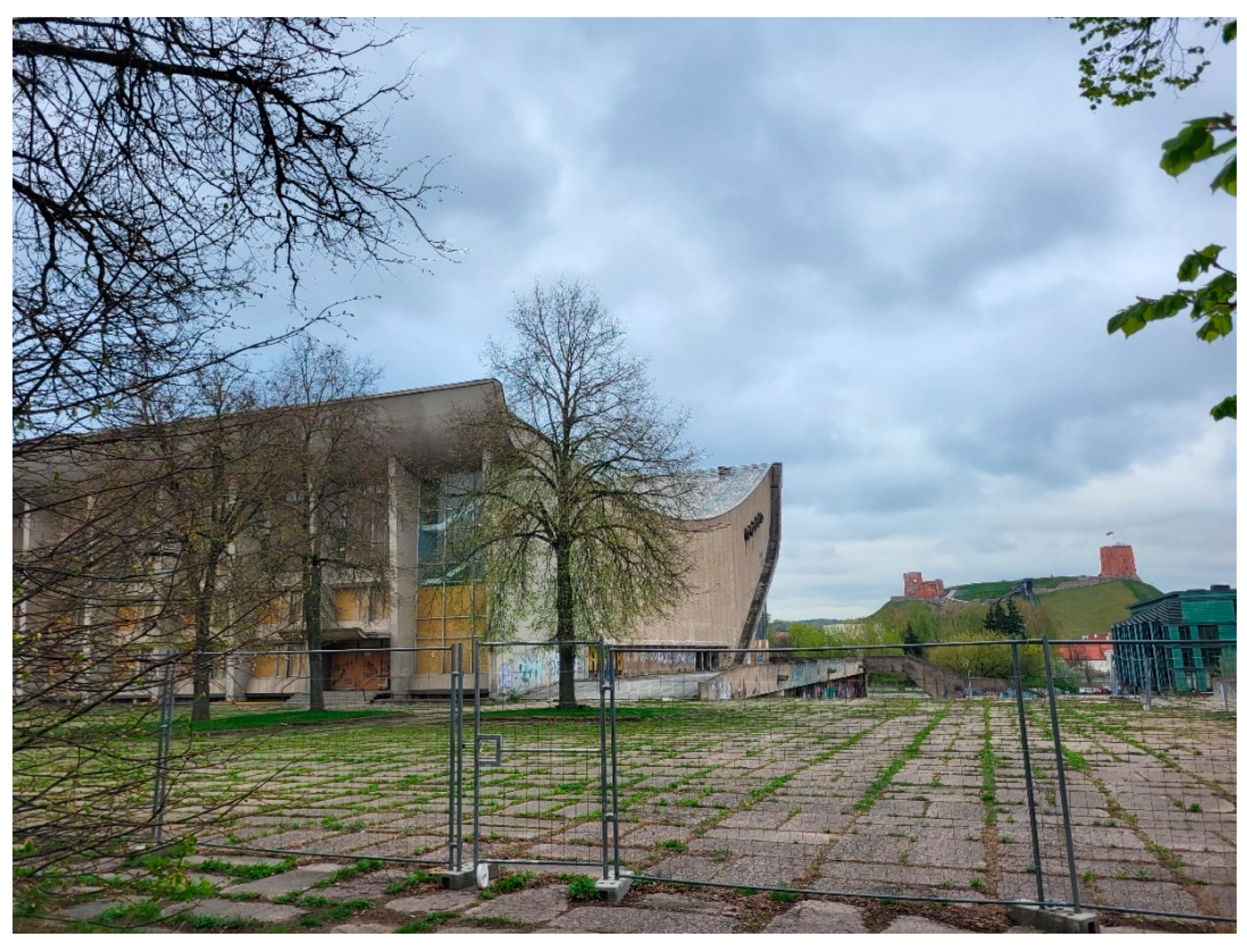
| Term | Description | References |
|---|---|---|
| Urban void | Unused, underused, abandoned, or misused spaces | Hwang and Lee 2020 |
| Lost spaces | Undesirable urban areas with no positive contribution to their surroundings and no connected elements in a coherent way | Trancik 1986 |
| Vacant or abandoned property | Buildings that have been vacant for two years or more | Accordino and Johnson 2000 |
| Terrain vague | Undefined empty places with immanent potential | De Sola-Morales 1996 |
| Waste space | Valueless space left after some act of production/consumption | Lynch 1990 |
| Urban void spaces | Underutilized, marginalized, or neglected spaces as non-planned entities with uncertain ownership | Aruninta 2004; Colomb 2012; Doron 2000; Hentilä and Lindborg 2003 |
| Brownfield | Post-industrial vacant land with contaminated and abandoned properties | Andres and Grésillon 2013 |
| Leftover spaces | Residual and neglected spaces | Akkerman and Cornfeld 2010; Hwang and Lee 2020 |
| Terra incognita | Lack of land-use policies and politics | Bowman and Pagano 2004 |
| Dead zone | Unproductive spaces | Doron 2000 |
| Planned wasteland/urban desert | Desolate abandoned spaces | Cybriwsky 1999 |
| Description | Source |
|---|---|
| Urban creativity and culture as key factors towards sustainable urban development | UNESCO 2004 |
| A vibrant, lively, and sustainable city with spaces that allow interaction among urbanites to resolve their problems and heighten their quality of lives | Landry 2000 |
| City with urban places where the 3Ts (Talent, Technology, Tolerance) are dominant to attract the creative class for better economic development | Florida 2002, 2005 |
| Cities with arts and cultural amenities | Grodach 2012 |
| Nurture creative sectors and brand the city to attract creative talent | Kong 2012 |
| A dynamic and open city that covers not only creative elements | Hall 2020 |
| Nurtured socio-cultural context shaped over time by the city’s history | Cooke & Lazzeretti 2008 |
| Nurtured cultural capital and creative institutions in a city | Scott 2006 |
| The concentration and the interaction between the talents and urban economic sectors where creative industries dominate | Lorenzen & Frederiksen 2008 |
| A city with produced goods and services with high cultural and symbolic value | Currid 2007; Tavano Blessi et al. 2012 |
| A city with a creative atmosphere for innovation and cross-fertilization | Bertacchini & Santagata 2012; Hall 2000; KEA, 2009 |
| A city with cultural initiatives and heritage-creativity hybridization, while the urban community and creative people interact for better social capital and image | Della Lucia and Trunfio 2018 |
| Description | Source |
|---|---|
| Interrelation between social, cultural, economic, and environmental aspects that warranty a long-term continuity of a project | Ratiu 2013 |
| Reconciliation of community integrity, economic development, and environmental protection | Krueger and Buckingham 2012 |
| Valuable repositories of human (both personal and social) meaning, and simultaneously, liveable, as well rejuvenated spaces | Kong 2009 |
| Preserving balanced retail systems set in diverse facilities and shopping environments for the needs of consumers | Cachinho and Salgueiro 2016 |
| Cities with an efficient network that delivers services and goods to the vicinity imply transformation into a desirable future | Barata-Salgueiro and Guimarães 2020 |
| The equilibrium among four fundamental dimensions including economic, social, environmental, and political | McGranahn and Satterthwaithe 2003; Aguilar 2007 |
| Open-ended community assembly, where direct human impacts on the natural environment are negligible | Kowarik 2018 |
| Description | Positive (+) or negative (–) | Source |
|---|---|---|
| CC solves systematically urban problems, using cultural and artistic forces combined with creative methods | + | Landry 2000 |
| CC fosters the growth of cultural endeavors and the sustainable development of creative industries | + | Sasaki 2010 |
| Sustainable urban development covers the dimension of culture in the planning process | + | Smidt-Jensen 2007; Steward and Kruska 2010 |
| Culture (creativity) as the fourth pillar of sustainable development besides the social, the economical and the environmental | + | Duxbury, Hosagrahar, and Pascual 2016; Hawkes 2001; UCLG 2010 |
| CC is under ongoing renewal while creativity is fuelled by small- and medium-sized businesses with high-quality labor | + | Jacobs 2004 |
| The aesthetic of CC in terms of urban creative class reflects contemporary virtues of urban sustainability | + | Krueger and Buckingham 2012 |
| Orientation to the creative class effects gentrification or social polarisation | – | Harvey 2012; Martí-Costa and Marc Pradel i Miquel 2012; McCann 2007; Pratt 2011; Scott 2006 |
| Planning of the creative city leads to the bureaucratization of creative processes | – | Pratt 2011; Scott 2006 |
| Creative policy effects polarization and deterioration of cultural workers’ working conditions | – | D’Ovidio and Rodríguez Morató 2017a |
| Cultural policies (including sustainable aspects) depend on the ideological assumptions | – | Ratiu 2013 |
| Sustainable culture-led urban regeneration respects the pre-existences and engages with genius loci | + | Casals-Alsina 2023 |
| The negative effect of standardized patterns and replicated models even if they are culture-led | – | Landry et al. 1996 |
| Integration of CCs and information technology, as well of CC and sustainable urban development | + | Aken 2016 |
Disclaimer/Publisher’s Note: The statements, opinions and data contained in all publications are solely those of the individual author(s) and contributor(s) and not of MDPI and/or the editor(s). MDPI and/or the editor(s) disclaim responsibility for any injury to people or property resulting from any ideas, methods, instructions or products referred to in the content. |
© 2024 by the authors. Licensee MDPI, Basel, Switzerland. This article is an open access article distributed under the terms and conditions of the Creative Commons Attribution (CC BY) license (http://creativecommons.org/licenses/by/4.0/).




